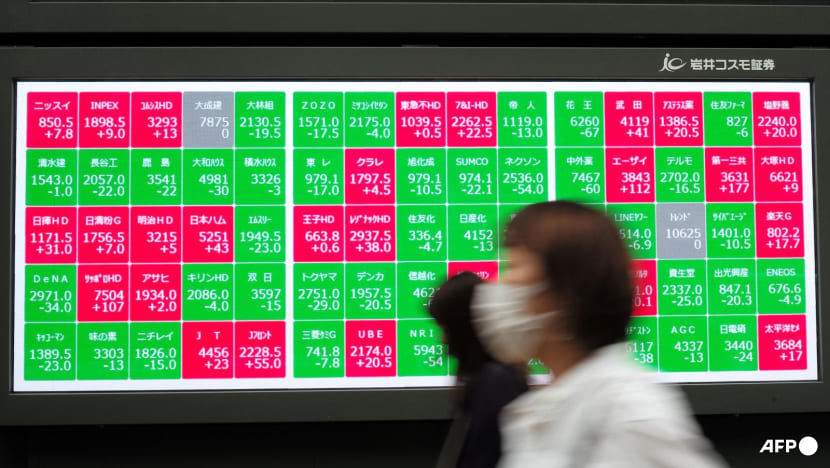Markets drop after US loses last triple-A credit rating

Pedestrians walk past an electronic board showing the Nikkei 225 index on the Tokyo Stock Exchange along a street in central Tokyo on May 19, 2025. (Photo: AFP/Kazuhiro Nogi)
HONG KONG: Stocks fell with the dollar on Monday (May 19) after Moody's removed the United States' last gold standard sovereign bond rating, citing the growing debt pile that it warned could balloon further.
The move dealt a blow to markets, which had enjoyed a healthy run-up last week after Washington and China hammered out a deal to temporarily slash tit-for-tat tariffs.
After the rout sparked by Donald Trump's Liberation Day tariffs bazooka, investors have in recent weeks raced back to buy up beaten-down stocks as the White House tempered its hardball tariff approach.
But selling returned on Monday after Moody's cut its rating on US debt to Aa1 from Aaa, noting "the increase over more than a decade in government debt and interest payment ratios to levels that are significantly higher than similarly rated sovereigns".
It added that it expected federal deficits to widen to almost 9 per cent of economic output by 2035, from 6.4 per cent last year, "driven mainly by increased interest payments on debt, rising entitlement spending, and relatively low revenue generation".
Analysts said the cut - which follows downgrades from S&P in 2011 and Fitch in 2023 - could indicate investors will want higher yields on Treasuries, pushing up the cost of government debt.
Treasury Secretary Scott Bessent dismissed the announcement, saying it was "a lagging indicator" and blaming Trump's predecessor Joe Biden.
"We didn't get here in the past 100 days," he told CNN. "It's the Biden administration and the spending that we have seen over the past four years that we inherited, 6.7 per cent deficit-to-GDP, the highest when we weren't in a recession, not in a war."
White House communications director Steven Cheung hit out at Moody's Analytics on X, singling out its chief economist Mark Zandi.
"Nobody takes his 'analysis' seriously. He has been proven wrong time and time again," Cheung posted.
The news added to a frustrating time for the US president after Congress failed to pass his "big, beautiful Bill" to extend tax cuts passed in his first term and impose new restrictions on welfare programmes.
Independent congressional analysts say the package would add more than US$4.8 trillion to the federal deficit over the coming decade.
The Bill came up short in a key vote owing to several Republican fiscal hawks, with Congressman French Hill, who chairs the House Financial Services Committee, saying the downgrade "is a strong reminder that our nation's fiscal house is not in order".
However, it cleared a key hurdle on Sunday, progressing out of the House Budget Committee after several lawmakers holding up the legislation dropped their opposition, though one, Josh Brecheen, said it "still required tweaking".
Tokyo, Sydney, Seoul, Singapore, Wellington, Mumbai, Bangkok and Taipei all fell, while US futures were also well down.
Equities in Hong Kong pared initial losses and Shanghai was flat as below-forecast Chinese retail sales figures reinforced the view that the world's number two economy continues to struggle even after officials unveiled fresh stimulus measures. The reading offset figures showing factory output picked up more than expected.
London, Paris and Frankfurt fell as British and European Union chiefs meet for a landmark summit designed to usher in a closer relationship between the two sides, five years after Brexit.
Ahead of the "reset" summit, diplomats said they had resolved key hurdles to an agreement.
The dollar was also down against its peers and gold recovered some recent losses owing to its safe haven appeal, rising to US$3,223 per ounce.
National Australia Bank's Ray Attrill said: "Moody's actions will have zero impact on any investor's ability or willingness to continue holding US Treasuries - that would likely require downgrades of four or five more notches."
And SPI Asset Management's Stephen Innes said investors would be more interested in upcoming data.
"Moody's may have dropped the mic, but for equity traders, the real test this week will be Main Street," he wrote in a note.
"We're heading into a make-or-break retail earnings slate - Target, Home Depot, Lowe's, TJX, Ralph Lauren all report - and this is where tariff theory collides with checkout-line reality.
"Yes, the S&P has clawed back 18 per cent since the 'Liberation Day' tariff blitz, but the consumer has been the market's unsung hero. Now they're about to be audited."
















